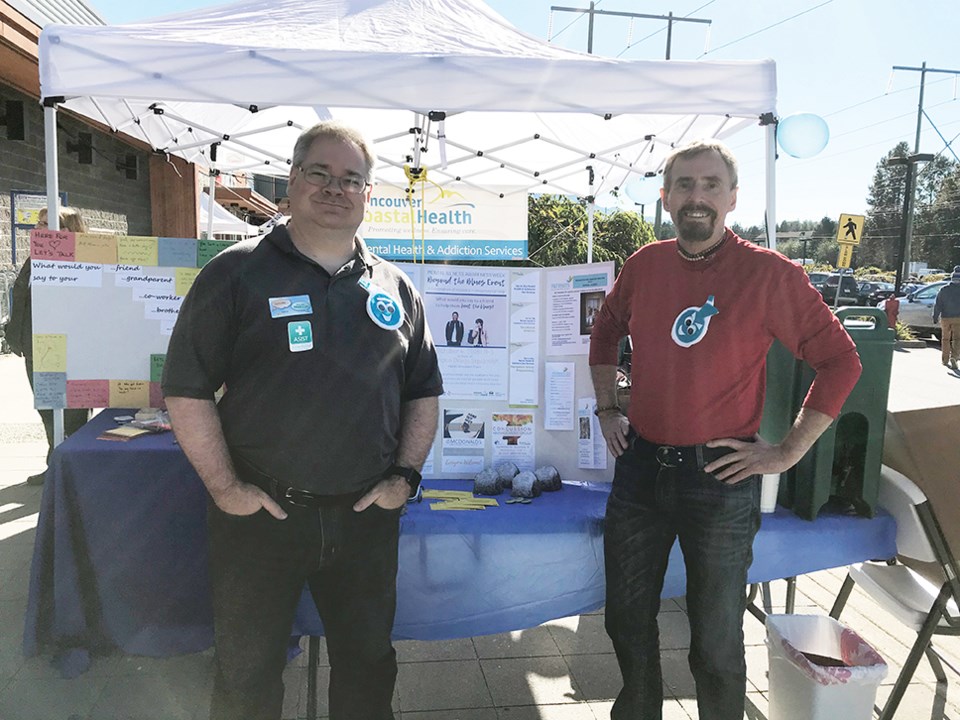Pass Eric Horrobin and Robert LeBlanc walking together down Cleveland Avenue and one would assume they were old-time Squamish friends — maybe they worked together at one of the mills before they closed — or maybe they played on the same recreational baseball team, one might assume.
And the men are friendly with each other, sometimes finishing each other’s sentences, but what bonds them is not what is likely to come to mind for most.
Both men have suffered the debilitating effects of mental illness.
Both men also recovered and currently work for Vancouver Coastal Health as peer support workers with Sea to Sky Mental Health and Substance Use Services.
Peers work with adult clients to help them increase confidence, learn new skills and attend community activities.
“Sometimes it is walking and talking... or helping them with meal planning and nutrition,” LeBlanc explained. “Often with mental illness there’s an energy issue — you just don’t have the energy to cook, to meal plan or to shop.”
Mental illness refers to a wide range of illnesses and disorders that impact mood, thinking, and behaviour.
For Horrobin, it meant a long period of depression and anxiety. He endured suicidal thoughts and low self-esteem, he recalled to The Chief. He was exhausted and fatigued. When a friend finally insisted on taking him to the hospital, he was diagnosed with major depression and anxiety.
For men, even in 2018, it can be hard to acknowledge that mental health is an issue, Horrobin said.
“Pull up your socks,” or “man up,” are examples of ideas men internalize when they are feeling down, he added.
Thirty years ago, when LeBlanc was first depressed, he thought it was burn out, he said.
“My wife had to drag me to my doctor at the time,” he said, adding other men were careful not to say the word depression to him.
“My doctor was trying to be really careful — it was in the early 1990s — he was trying not to frame it as a mental illness because in those days — talking to another guy about it — he was framing it as a ‘chemical imbalance of the brain.’”
Depression can hit anyone at any age or socio-economic status, the men stress, but they do see some themes among Squamish clients they see.
Single moms trying to make ends meet is one example.
“They have a lot of burdens and a lot of emotional... horror stories of how they have got to where they are,” Horrobin said.
Another example is the resident who is comparing his or her life to the more successful neighbour’s, Horrobin said.
Squamish residents who are living in the same house they were a few years ago are suddenly seeing people move in next door with nicer cars, bikes and more money to spend, Horrobin added. That can trigger depression for some.
The one takeaway both men say they hope people get from hearing their stories is that it is OK to seek help.
“Don’t suffer in silence,” added LeBlanc. “There is hope.”
Both men recovered with therapy and other treatments.
It took time, Horrobin stresses, but “after many years and attending many programs and groups, I moved from being a victim of depression to regaining control of my life.”
He then discovered peer support worker training.
“I now use my lived experience to support others and model recovery and hope for the future,” he said.
The support workers listen without judgment, both men said.
To get help, the first step is to see a family doctor, said Shelagh Smith, the manager of Sea-to-Sky Mental Illness and Substance Use Services.
People can self refer, or a partner can refer a loved one to a mental health team in Squamish, she said.
“[Next] they would meet with an intake worker, through our assessment, treatment-matching service and there might be other resources in the community that people feel is a better match or they may be seen through our mental health team,” Smith said.
In Squamish, there is not a long wait for mental health services, according to Smith.
“If someone is really in crisis and needing to be seen, within 24-hours of receiving the referral, in most cases they will get a callback,” she said.
There are online options for help such as Bounce Back, which is available from the Canadian Mental Health Association’s British Columbia Division for people with difficulties with anxiety and mood. The websites for Anxiety BC and Canadian Mental Health Association, are helpful, Smith said.
For more Sea-to-Sky Mental Illness and Substance Use Services in Squamish, call 604-815-3008. (Phone lines open Monday to Friday from 8:30 a.m. to 4:30 p.m.)
In crisis, call the Crisis Centre of BC at 604-872-3111 (phone lines open 24 hours a day, seven days a week).



